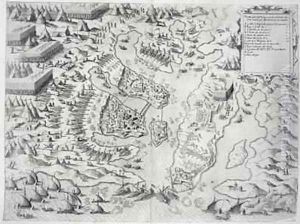Francesco de Marchi Paintings
Francesco de Marchi was an Italian polymath, known for his work as an architect, engineer, soldier, and writer during the Renaissance period. Born in 1504 in Bologna, Italy, de Marchi was a figure whose interests and talents spanned a wide range of fields. Although not as famous as some of his contemporaries, his contributions to architecture and military engineering were significant for his time.
De Marchi is best known for his work in fortification, reflecting the era's shifting military technologies and the need for improved defenses against cannon warfare. He was part of the movement towards the bastion fort, which was a response to the inadequacies of medieval castle fortifications against the siege warfare of the 16th century. His writings on the subject were influential and reflected a deep understanding of both the theoretical and practical aspects of military architecture.
Aside from his military and engineering work, de Marchi was also involved in the exploration of the Alps and is noted for being one of the first to attempt a systematic study of mountaineering. In his writings, he discussed various aspects of alpine travel, from the practicalities of organizing expeditions to the experiences and sensations of being in the mountains.
Throughout his life, Francesco de Marchi was employed by various noble patrons for whom he carried out engineering and architectural projects. His career took him to different parts of Italy and even into the service of the Holy Roman Emperor, for whom he worked as an engineer. De Marchi's life was a testament to the Renaissance ideal of the polymath – a person of wide-ranging knowledge and learning.
He died in 1576, leaving behind a legacy that, while not as well-known as that of figures like Leonardo da Vinci or Michelangelo, is nonetheless an important part of the rich tapestry of Renaissance intellectual and scientific exploration. His works, including his treatise on fortifications, continued to be referenced by military engineers well after his death.
